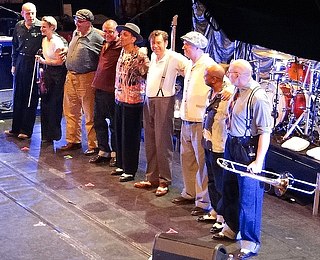
Dexys are an English pop rock band from Birmingham, with soul influences, who achieved major commercial success in the early to mid- 1980s. They are best known in the UK for their songs "Geno" and "Come On Eileen", both of which reached No. 1 on the UK Singles Chart, and achieved six other top-20 singles. "Come On Eileen" also topped the US Billboard Hot 100, and, with extensive airplay on MTV, they are associated with the Second British Invasion.
The Bureau were an English new wave soul group formed in November 1980 in Birmingham, England, when the original line-up of Dexys Midnight Runners split up. The Bureau retained their Dexys roots and played powerful brass-driven soul sounds. They are best known for their single "Only For Sheep", which reached No. 5 in Australia.

Kevin Rowland is a British singer and musician best known as the frontman for the pop band Dexys Midnight Runners. The band had several hits in the early 1980s, the most notable being "Geno" and "Come On Eileen", both of which reached number one on the UK Singles Chart.

"Come On Eileen" is a song by the English group Dexys Midnight Runners, released in the United Kingdom in June 1982 as a single from their second studio album Too-Rye-Ay. It reached number one in the United States and was their second number one hit in the UK, following 1980's "Geno". The song was produced by Clive Langer and Alan Winstanley and was initially claimed to be written by Kevin Rowland, Jim Paterson and Billy Adams, although Rowland later stated that the essence of the tune should be attributed to Kevin Archer.
Kevin "Al" Archer is an English guitarist and songwriter.
Helen O'Hara is a British musician. She was a member and violinist of Dexys Midnight Runners from 1982 to 1987, including performing on songs such as "Come on Eileen", and in 2021 rejoined the band.

Searching for the Young Soul Rebels is the debut studio album by English band Dexys Midnight Runners, released on 11 July 1980, through Parlophone and EMI Records. Led by Kevin Rowland, the band formed in 1978 in Birmingham, England, and formed a strong live reputation before recording their first material. Recorded during April 1980, the album combines the aggressiveness of punk rock with soul music, particularly influenced by the Northern soul movement.
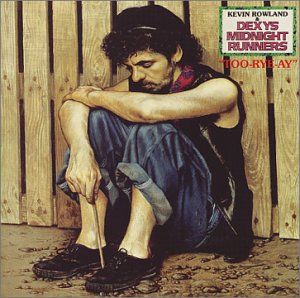
Too-Rye-Ay is the second studio album by English pop band Dexys Midnight Runners. It was released in July 1982 by Mercury Records. The album is best known for the hit single "Come On Eileen", which included the refrain that inspired the album's title. It was the band's most successful album, debuting at number two on the UK Albums Chart.

Don't Stand Me Down is the third studio album by English pop band Dexys Midnight Runners, released in September 1985 by Mercury Records. The title of the album was inspired by a line in the album's song "The Waltz".
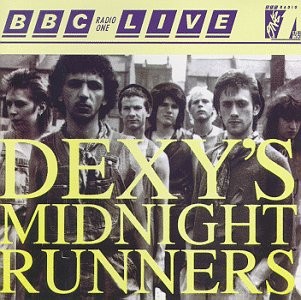
BBC Radio One Live in Concert was a live album by Dexys Midnight Runners, recorded for the BBC in 1982 and released in 1995. It was the group's first official live album and remained their only official live album until the release of The Projected Passion Revue in 2007. The album is unique as it is Dexys' only live recording where the members of The Projected Passion Revue horn section are present alongside the Too-Rye-Ay strings. Immediately after this concert, the horn section left the group and formed The TKO Horns.

"Geno" is a song by Dexys Midnight Runners, released in 1980 as the lead single from their debut album Searching for the Young Soul Rebels. Written by Kevin Archer and Kevin Rowland, it was the band's second overall single and their first UK number one, staying at the top of the singles chart for two weeks. In Ireland, the song charted at number two.

Paul George Speare is an English composer, producer, freelance saxophonist and flute player, formerly a member of Dexys Midnight Runners and The TKO Horns.
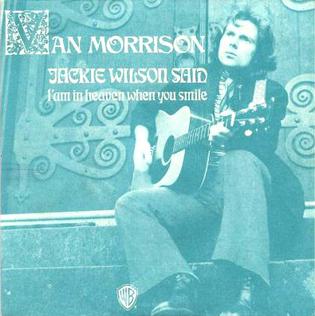
"Jackie Wilson Said (I'm in Heaven When You Smile)" is a song written and performed by Van Morrison and featured as the opening track on his sixth studio album, Saint Dominic's Preview. It was released by Warner Bros. in July 1972 as the first of three singles from the album and charted at number sixty-one on the US Billboard Hot 100. Both the music and lyrics are inspired by rhythm and blues singer Jackie Wilson and his song "Reet Petite", which is directly quoted in the song.
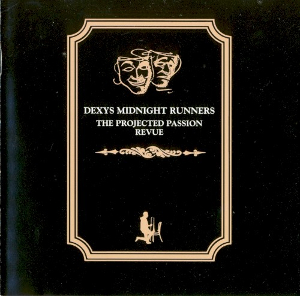
The Projected Passion Revue is a compilation album by the group Dexys Midnight Runners, comprising recordings made in 1981, between the group's first album Searching for the Young Soul Rebels and its second, Too-Rye-Ay. The album represents a stage in the group's development which built upon the blue-eyed soul sound of the original line-up, but came before the group's adoption of a significant folk influence.

"There, There, My Dear" is a song by English pop band Dexys Midnight Runners, released in June 1980 as the second and final single from their debut album Searching for the Young Soul Rebels. It peaked at number 7 on the UK Singles Chart.

One Day I'm Going to Soar is a 2012 album by Dexys, the band formerly known as Dexys Midnight Runners. It was the band's fourth studio album, but its first in 27 years. The album features, alongside Dexys' lead singer Kevin Rowland, 1980s Dexys members Big "Jim" Paterson, Pete Williams and Mick Talbot, new recruits Neil Hubbard, Tim Cansfield and Lucy Morgan, and guest vocalist Madeleine Hyland, who duets with Rowland on several songs.

Let's Make This Precious: The Best of Dexys Midnight Runners is a best-of compilation album by Dexys Midnight Runners, which also contained two newly recorded songs by the group, "Manhood" and "My Life in England ". Dexys had broken up in early 1987, and these two songs, recorded in 2003, were the first new Dexys material since the single "Because of You" in 1986. Nevertheless, the album was similar to the 1991 compilation The Very Best of Dexys Midnight Runners, as eleven of the sixteen older Dexys songs on it had also been included on that album. However, to record the two new songs, Rowland put together a new version of Dexys that featured prior members Pete Williams and Mick Talbot (keyboards) plus new members such as Lucy Morgan (viola) and Neil Hubbard (guitar), and the reformed band played a series of live concerts later in 2003.

Let the Record Show: Dexys Do Irish and Country Soul is a 2016 album by Dexys, the band formerly known as Dexys Midnight Runners. The album includes interpretations of Irish songs and other select compositions. It reached number 10 in the UK Albums Chart on 10 June 2016.
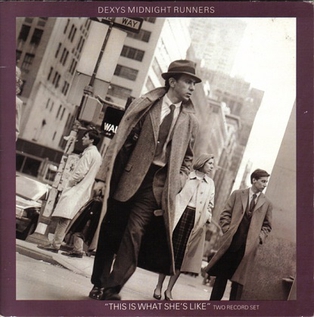
"This Is What She's Like" is a song by Dexys Midnight Runners, released on their third studio album Don't Stand Me Down in September 1985 by Mercury Records, and in November 1985 as a single. The song is credited to Kevin Rowland, Billy Adams, and Helen O'Hara, with production by Rowland and Alan Winstanley. The song, inspired by Rowland's relationship with O'Hara, includes spoken conversations between Rowland and Adams. Rather than answering Adams's repeated in-song question about what "she" is like, Rowland contrasts the "she" of the title with people who irritate him, for example those who put creases in their jeans, and members of the Campaign for Nuclear Disarmament.
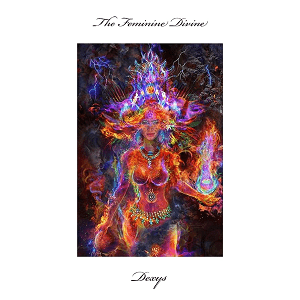
The Feminine Divine is the sixth studio album by the English band Dexys, released on 28 July 2023 by 100% Records. The tracks were written by Kevin Rowland, Sean Read, Mike Timothy and Jim Paterson, and the album was produced by Pete Schwier and Toby Chapman. It was the group's first album of original songs since One Day I'm Going to Soar (2012) and their first album in seven years since Let the Record Show (2016). It is a concept album themed around Rowland's progress across three decades from being sexist to becoming a champion for women.

















